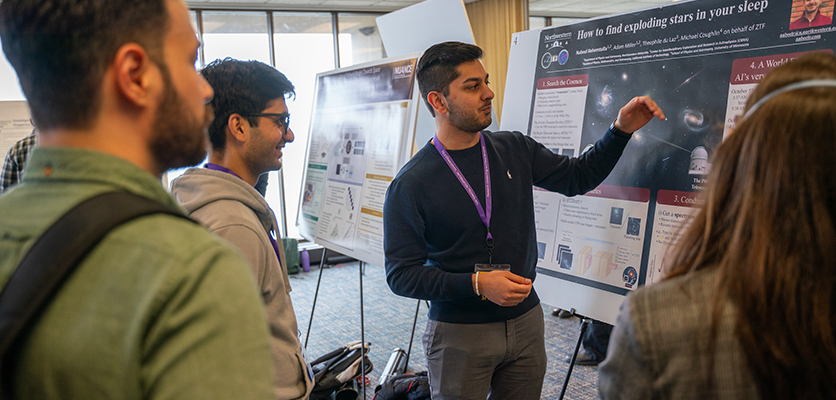Northwestern Celebrates Research Achievement and Discovery at CoDEx 2024
Posted Date: April 11, 2024
The growing interconnectedness of technology and research across disciplines is not just blurring the lines between traditional fields; it's creating entirely new landscapes of knowledge and innovation.”
Joe Paris,
Senior Director of Research Computing and Technology Support Services, Northwestern IT
April showers did not dampen the enthusiasm of the more than 200 Northwestern research community members who attended the Computation and Data Exchange (CoDEx) symposium on April 2 at the Norris University Center. The campus-wide event, hosted by Northwestern Information Technology (IT) and sponsored by the Office of the Provost, showcased innovative approaches to computational and data-intensive research.
The program began with early morning interactive workshops led by Northwestern IT Research Computing and Data Services (RCDS) staff. These workshops offered review and evaluation tips for coders using ChatGPT, ways to improve research collaboration using Github, and tools to help enhance the clarity and impact of data with visualizations.
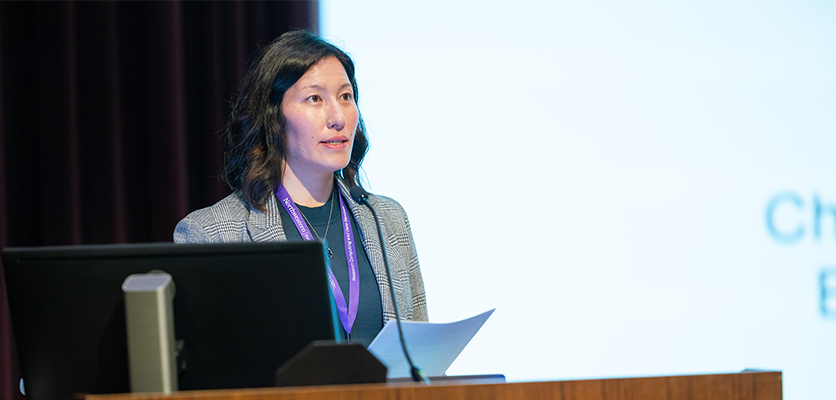 CoDEx officially opened with a welcome from Jackie Milhans, director of research computing and data in Northwestern IT. In her opening remarks, Jackie emphasized the rapid growth and variation of research during her time at Northwestern and the challenges of such growth.
CoDEx officially opened with a welcome from Jackie Milhans, director of research computing and data in Northwestern IT. In her opening remarks, Jackie emphasized the rapid growth and variation of research during her time at Northwestern and the challenges of such growth.
“I joined Northwestern nearly 10 years ago when the University was providing only high-performance computing (HPC) services for our researchers, and even then, Northwestern was a leader in that space,” said Milhans. “Research has now become more complex and more complicated. We are seeing bigger collaborations, data sets grow in size and complexity, and data-sharing requirements for federally funded research require more planning and effort around how we manage and provide access to our research data. Data security concerns and regulations can introduce barriers to research productivity, or it can certainly feel that way, and the list goes on.”
Milhans commented on how recent technological advances are impacting research methods and strategies. “Now, we are seeing an increased use of AI, machine learning, and data science methods. More people are learning programming skills, improving their data literacy, and using powerful data resources to improve their research. I am thrilled that Northwestern is choosing to grow in these areas, and I'm happy to say that the Research Computing and Data Services team has expanded its expertise to support researchers in navigating this evolving landscape.”
Sumit Dhar, associate provost for faculty, Office of the Provost, introduced the morning guest keynote and praised the RCDS team. “I want to take a moment to recognize the enormous amount of work the team has accomplished, not only in organizing CoDEx but also in expanding the services they offer to the research community. Their knowledge, promptness, and completeness of the services they provide are impressive. If you haven't taken advantage of all they offer, please do!”
Keynote Recaps
Guest keynote speaker Beth A. Plale, Michael A. and Laurie Burns McRobbie bicentennial professor of computer engineering and executive director, Pervasive Technology Institute, Indiana University, gave a talk titled, Navigating the Dynamic Landscape of Computational Research: Artificial Intelligence, Open Science, and Reproducibility.
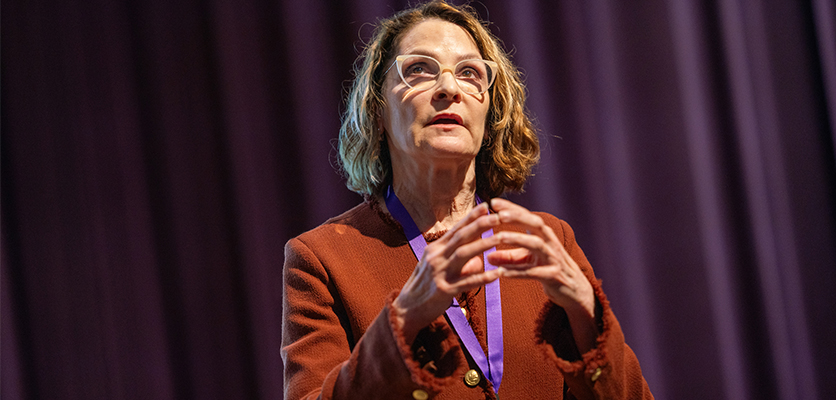 Among other topics, Plale described how data used in academic research and data generated in academic research travel distinct paths along the data lifecycle concerning navigating the open science ecosystem.
Among other topics, Plale described how data used in academic research and data generated in academic research travel distinct paths along the data lifecycle concerning navigating the open science ecosystem.
She also shared how researchers can continue strengthening their partnerships and professional engagement. One suggestion was advocating for the growing call to develop what she called “the missing middle” tier of “by community for community” research governance that would facilitate researchers in establishing collective standards and oversight for open research and data sources. The proposed tier would supplement the other government-imposed and University-imposed research governance categories.
Plale also urged researchers to support the widespread adoption of both ORCiD (Open Research Contributor ID), which ensures researchers maintain consistent authoring credit for their published work on a global scale, and PIDs (persistent identifiers), which are long-lasting, globally reliable, unique references associated with a specific digital entity. Unlike URLs, which may break over time or have access restrictions, a PID is intended to ensure that people, grants, organizations, projects, software, and outputs that are openly sourced remain recognized and linked to their originators.
Thomas McDade, Carlos Montezuma professor and faculty fellow at the Institute for Policy Research, Department of Anthropology, Weinberg College of Arts and Sciences, Northwestern University, gave the afternoon keynote. His talk was titled, Illuminating the Determinants of Health at the Interface of the Social and Biological Sciences.
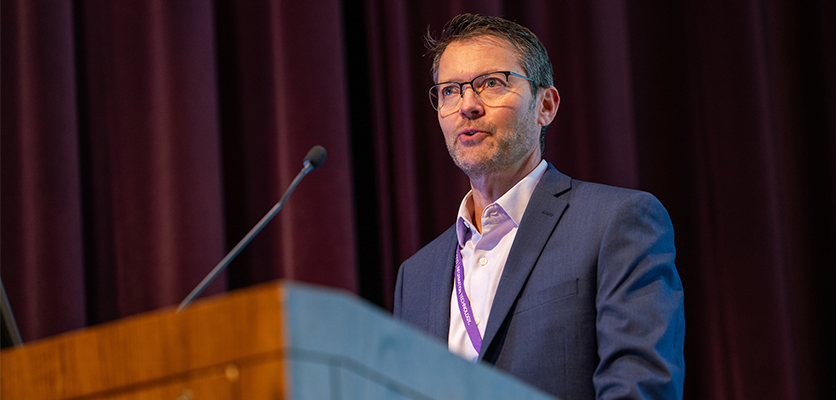 McDade prefaced his deep dive into current research by sharing the overall challenge his research hopes to achieve, “[to] leverage novel data resources to advance our understanding of how experience becomes biology and shapes health over the life course.” He went on to detail how qualitative evidence presents correlations between changes in human biology and lived experience.
McDade prefaced his deep dive into current research by sharing the overall challenge his research hopes to achieve, “[to] leverage novel data resources to advance our understanding of how experience becomes biology and shapes health over the life course.” He went on to detail how qualitative evidence presents correlations between changes in human biology and lived experience.
He focused on research tracking a correlation between inflammation later in life (a standard indicator of the body's defense against bacteria or other harms) and the experience of being breastfed in infancy. In turn, these findings can help inform policy to support mothers who choose to breastfeed.
Spotlight on Student Researchers
Throughout the day, attendees engaged in talks on topics ranging from Detecting Gender Embodiment Using 3D Video Analysis to Paradigms and Hierarchies: Linking Knowledge Structures and Social Order in Science, and a panel discussion on The Future of AI-aided Research: The Confluence of Human, Artificial, and Collective Intelligence.
Participants were treated to an impressive array of posters, visualizations, and lightning talks presented by postdocs and graduate and undergraduate students eager to share their research discoveries. Awards were presented for outstanding poster presentations and data visualizations.
Looking Ahead at Connections Between Research and Technology
Joe Paris, senior director of research computing and technology support services in Northwestern IT, concluded the day by thanking those in attendance for their extraordinary research efforts. “The growing interconnectedness of technology and research across disciplines is not just blurring the lines between traditional fields; it's creating entirely new landscapes of knowledge and innovation. Embracing these opportunities requires us to come together, [at events such as CoDEx] harnessing diverse expertise and perspectives, to address complex challenges and unlock the full potential of interdisciplinary collaboration.”
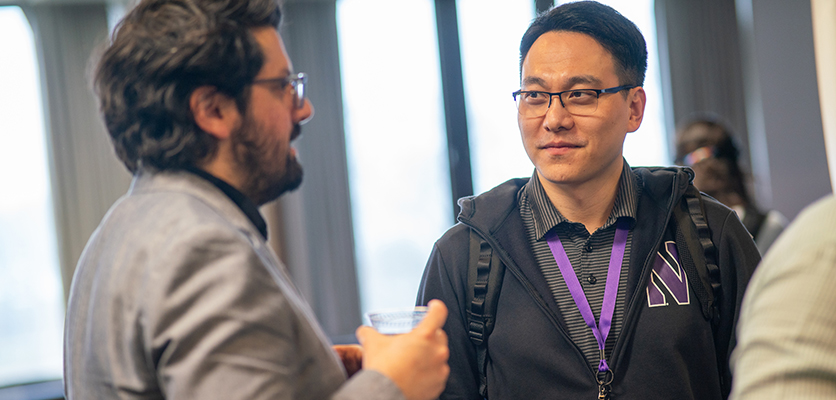 If you missed this year's symposium, we hope you attend next year to connect with the cross-disciplinary research community and learn about innovative work occurring across the University. View the highlights from CoDEx 2024.
If you missed this year's symposium, we hope you attend next year to connect with the cross-disciplinary research community and learn about innovative work occurring across the University. View the highlights from CoDEx 2024.
Northwestern IT is already busy planning for CoDEx 2025. Until then, please visit the Research Computing and Data Services website to learn about upcoming workshops, events, and resources for our research community.
